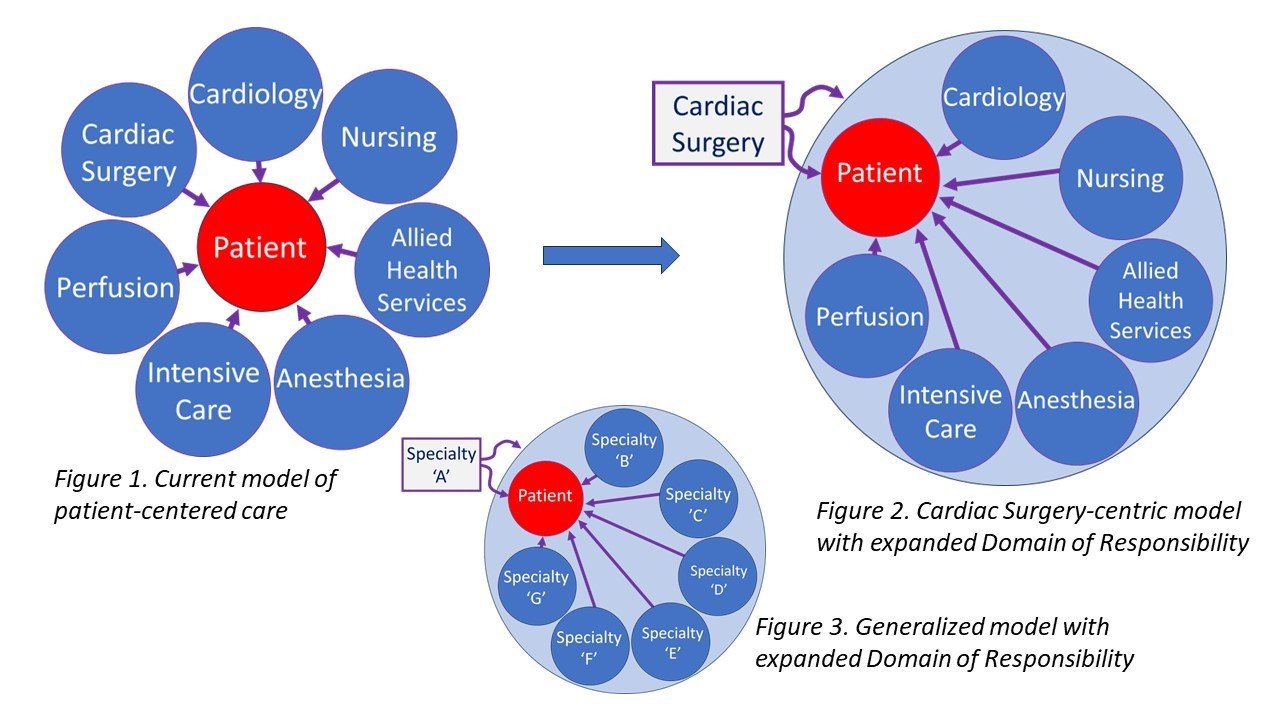Domain of Responsibility - and Improving Heart Center Performance with a Single Question
“Patient-centered care” is commonly cited as the model whereby Heart Centers deliver care to patients with congenital heart disease (Figure 1). This model, however, is flawed and fails to optimize team performance. Asking a simple question can remedy this flaw.
In the classically depicted model of patient-centered care, the patient is placed at the center of the model and each contributor to patient care provides service within their domain of responsibility (e.g surgery is responsible for surgical care, anesthesia is responsible for anesthetic care, etc…). There is a subtle implication that each specialty provides care to the patient within a specific domain of responsibility that is limited to the activities of the specialist, and in this model, the domain of responsibility does not extend beyond the connection between the specialty and the patient. For example, the congenital heart surgeons provide surgical care to the patient and, although outcomes may be influenced by other specialties, the activity of the other specialties is considered outside the domain of responsibility of the surgeon; “I did a fine operation, and they messed it up” is a tragically common refrain when postoperative problems are encountered. This perspective is based on a concept of a narrow domain of responsibility – and the narrowness of this domain contributes to degradation of overall team performance.
If the surgical group (or any other group) wants to optimize the performance of the entire Heart Center, the surgical group must assume responsibility for the care provided by the surgeons and the care provided by other specialties (Figure 2). Although surgeons do not directly administer care in the cardiology clinic, the ICU, or on the scrub nurse’s table, etc…, anything that the surgeon can do to make their partner’s respective jobs easier can have a profound effect on overall team performance. This concept sounds simple and any surgeon reading this narrative is undoubtedly nodding his/her head while thinking ‘Yeah, I already do all that I can do to help my colleagues’. Is that statement actually true – are you doing all that you can do?
Surgeons are likely to cite full investment in multi-disciplinary rounds, participation in ICU hand-offs, 24/7 availability, and excellent leadership/communication skills as examples of how they help their colleagues. But what about going a layer deeper? For a minor hypothetical example, let’s imagine that Surgeon A works in a group practice but is the sole surgeon with a set of ‘special’ instruments on his/her surgical tray that are rarely used. Despite requests to simplify the instrument tray, Surgeon A steadfastly demands that the instruments remain on the tray to avoid a delay on the rare occasion that the instruments are needed. In fact, the delay that might occur will not harm the patient and constitutes a rare and insignificant inconvenience. Although Surgeon A may not see it this way, this stubbornness adds to the workload of the scrub nurses (which is a waste of resources) and adds to the burden required to train new scrub nurses (further wasting resources) and, therefore, degrades the overall performance of the team. In fact, every action (or inaction) that a surgeon makes enhances (or degrades) the performance of the entire Heart Center.
I am picking on surgeons here because I am a surgeon - but the same argument applies to every specialty engaged in the care of congenital heart patients. The model can more broadly apply to many overlapping Domains of Responsibility where Anesthetists strive to make the Invensivist’s job easier; Intensivist’s strive to make the Cardiologist’s job easier, and so on…. While every clinical specialty focuses on providing excellent care to the patient, they should also seek to identify opportunities to improve the effectiveness of other engaged specialties.
Yes, the patient may be the ultimate customer in a Congenital Heart Center, but the expanded concept of the Domain of Responsibility suggests that your collaborating specialties are also your customers. To reiterate, your collaborating specialties are also your customers (Figure 3). Serving your collaborating specialties with as much dedication as you serve your patient will help optimize overall team performance and therefore improve delivery of care to the patient.
Want to test this idea? Give this a try: Ask each of the other teams in your Heart Center “What can I do to make your job easier?” You will be surprised at the opportunities that are unlocked through the simple act of asking. Expand your Domain of Responsibility. It is not about being nice, it's about winning.


